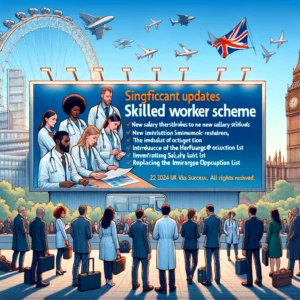UK Immigration Update 2024: Key Changes Explained
Embracing Change in the Skilled Worker Scheme

The Home Secretary announced significant adjustments on 4 December 2023, aimed at reducing net migration. These changes encourage investment in the domestic workforce and ensure salaries reflect the national average for eligible positions.
Salary Threshold Adjustments
You’ll need to ensure that the salary you offer meets the updated requirements. Previously, the minimum threshold was £26,200, based on the lower quartile of UK earnings. Now, this has increased to £38,700, aligning with median earnings across eligible occupations. This shift from the 25th percentile to the median aims to provide a fairer wage distribution.
For specific roles, particularly those under the Health and Care Visa, the rules slightly differ. These positions will adhere to a revised general threshold of £29,000, up from £26,200, still based on the lower quartile but updated with the latest figures from the Office for National Statistics (ONS).
Updates for Health and Care Visas
Clarifications have refined the criteria for Health and Care Visas, keeping the fundamental requirements intact. These adjustments ensure salaries align with the Immigration Rules, preserving the visa offer’s integrity and purpose.
Transitioning to the Immigration Salary List
A significant change is the replacement of the Shortage Occupation List with the new Immigration Salary List . This aims to clearly define occupations eligible for a reduced salary threshold, moving away from the concept of a shortage list. The Migration Advisory Committee (MAC) has informed this update, with a comprehensive review scheduled for later in 2024.
Retaining Salary Discounts
Despite the adjustments, certain salary discounts remain for holders of relevant PhDs, new entrants to the labour market, and those in national pay scale occupations. The latest ONS pay data has updated these concessions, ensuring they stay relevant and beneficial.
Simplifying the Rules
Finally, efforts have been made to streamline the Skilled Worker rules. This includes removing outdated provisions and simplifying language, making it easier for both employers and applicants to understand their obligations and opportunities within the UK immigration system.
Senior or Specialist Workers under the Global Business Mobility Routes
If you’re sponsoring Senior or Specialist Workers under the Global Business Mobility routes, the general salary threshold has now increased from £45,800 to £48,500. This adjustment ensures salaries match the current market standards according to the latest ONS data.
Graduate Trainees’ New Salary Benchmarks
Graduate Trainees in the Global Business Mobility sector will now see their general salary threshold move up from £24,220 to £25,410. The calculation for going rates remains pegged at 70% of the 25th percentile but reflects the most current ONS statistics.
Scale-up Route Adjustments
For those on the Scale-up route, prepare for the general salary threshold to rise from £34,600 to £36,300. Like the others, this change mirrors the latest salary trends captured by the ONS.
Seasonal Workers in the Poultry Sector
There’s a notable increase for certain poultry workers within the Seasonal Workers route. Salaries have jumped from £26,200 and £10.75 per hour to a substantial £38,700 and £15.88 per hour, aligning with the updated standards for Skilled Workers.
Moving Beyond the Shortage Occupation List
The transition from the Shortage Occupation List to the new Immigration Salary List has implications across various routes. Additionally, creative workers will now need to prove their unique contribution to the UK’s creative life, rather than relying on shortage exemptions.
The New SOC 2020 System
The Standard Occupational Classification (SOC) system is getting an upgrade. Moving from SOC 2010 to SOC 2020 means all new data will reflect the updated classification, ensuring a more accurate representation of occupations in the immigration system.
What This Means for Skilled Occupations
The Appendix Skilled Occupations is transitioning to a version based on SOC 2020. This change might affect some workers’ eligibility, but additional tables will support those looking to extend their stay or settle.
Adjusting the Minimum Income Requirement for Partners and Children
If you’re planning to apply for a partner or child visa under Appendix FM, it’s important to know that the minimum income requirement has seen its first update in over a decade. The requirement now stands at £29,000.
The Home Office maintains that the update respects Article 8 of the European Convention on Human Rights, which covers the right to private and family life. It emphasises a balance between individual rights and the country’s economic interests, including immigration control and public safety. This change aligns with efforts to safeguard the UK’s economic well-being by ensuring that those moving to the UK are more likely to contribute positively to public finances.
Transitional Arrangements for Current Applicants
For those already on a path to settlement under the family visa category before 11 April 2024, or who applied before this date, there’s good news. You’ll continue to meet the previous minimum income requirement for the duration of your route, as long as you’re staying with the same partner or if you’re a child accompanying a parent.
Exceptional Circumstances Considered
The rules still account for exceptional circumstances, ensuring the welfare of children is a priority. If you face insurmountable obstacles to living outside the UK with your partner, or if it’s unreasonable for your child to leave the UK, you may still be granted leave despite not meeting the minimum income threshold. Those qualifying under these conditions will be on a 10-year route to settlement, with leave granted in increments.
These updates to the minimum income requirement reflect a balanced approach, aiming to ensure that families moving to the UK can be self-sufficient while contributing to the country’s economic goals. Transition measures and considerations for exceptional circumstances ensure fairness and compassion in the application process.
Expanding Support for Domestic Abuse Victims with Pre-Settled Status
If you’re an EU, EEA, or Swiss citizen living in the UK with pre-settled status under the EU Settlement Scheme (EUSS), there’s important news regarding support for victims of domestic abuse. Previously, victims of domestic abuse could seek immediate settlement in the UK if they were in a relationship with an EEA or Swiss citizen who had settled or pre-settled status. Now, the rules have broadened to offer more support.
Inclusive Settlement Provisions
This update means that if you’re a spouse, civil partner, or durable partner with pre-settled status, along with your dependent children, you’re now included. You can seek immediate settlement under the Appendix Victim of Domestic Abuse. This change aims to treat all partners of EEA and Swiss citizens equally, offering crucial support to those affected by domestic abuse.
Access to Public Funds

While waiting for the outcome of your application under the Appendix Victim of Domestic Abuse, you’ll have access to public funds through the Migrant Victims of Domestic Abuse Concession. This provision is a lifeline, ensuring you’re not left without support during this challenging time.
Future Settlement and Continuous Residence
Even with immediate settlement under these new provisions, you can still apply for settled status under the EUSS when you’re eligible, based on your continuous residence in the UK.
Simplifying Immigration Rules for Long Residence
The new Appendix Long Residence has made its way to the forefront, promising a more streamlined approach to immigration based on long residence in the UK.
Consistent Requirements Across the Board
One of the key updates includes the harmonisation of requirements across different immigration routes. Now, the criteria from Appendix Continuous Residence, Appendix English Language, and Appendix KOL UK (Knowledge of Life in the UK) are uniformly applied to the Long Residence route.
Also, you’ll now need to have had your current permission for at least one year or have been exempt from immigration control during the 12 months immediately before your application to qualify for settlement through this route. This change is designed to align the Long Residence route with broader settlement requirements, making it essential for applicants to meet these conditions for a successful application.
Temporary Permissions
For those seeking temporary permission to stay in the UK, the conditions for grants have been standardised, aiming to offer clarity and consistency.
If you’re a private servant for a diplomat planning to work in the UK, you’ll now need to show proof of your salary. Additionally, you’ll have to meet an English language requirement.
Creative Worker Route Changes
For those in the creative field, the need for your job to be listed on the Shortage Occupation List or to undergo resident labour market testing has been removed. This streamlines the application process, making it easier for talented creatives to work in the UK. However, if you’re part of a group application, be aware that if any entertainer or cultural artist in the group is refused, all linked applications might also face refusal. Sponsors are also required to disclose any expenses paid to you and whether they plan to recoup these costs.
Developments in Government Authorised Exchange Route
The Government Authorised Exchange schemes have introduced the “Future technology research and innovation scheme,” focusing on cutting-edge developments. This addition opens new avenues for those involved in pioneering technology research and innovation, offering a unique opportunity to contribute to the UK’s tech landscape. Meanwhile, the authorities have phased out outdated schemes to ensure the programme stays relevant and focuses on current needs.
Expansion in Sports Governing Bodies
For sports enthusiasts, authorities have recognised the Scottish Canoe Association as the governing body for canoeing in Scotland. This update may impact athletes and sports professionals involved in canoeing, offering clearer guidance and support within the sport.
The New Electronic Travel Authorisation (ETA) Rules
What is an ETA?
If you’re a non-visa national, including EEA citizens, planning to visit or transit through the UK for up to six months, you now need an Electronic Travel Authorisation (ETA). This requirement ensures you have permission to travel, simplifying your entry into the UK.
Who Should Apply for an ETA?
Starting with Qatar nationals on 25 October 2023, the UKVI introduced the ETA requirement. It then extended this to include Bahrain, Kuwait, Oman, Saudi Arabia, the United Arab Emirates, and Jordan from 1 February 2024. Throughout 2024, more non-visa nationals will need to apply. This includes those coming to the UK under the Temporary Work – Creative Worker concession.
Improvements to the ETA System
The UKVI has made several updates to the ETA process to address initial feedback. These updates provide a clear definition of an ‘overstay’ in line with current visitor policies. They also establish that an ETA is only valid with the passport used for the application. Additionally, they introduce criteria for cancelling an ETA. This applies if it fails to meet validity requirements either at the time of application or afterwards.
British Overseas Territories Citizens do not need an ETA to travel to the UK.
